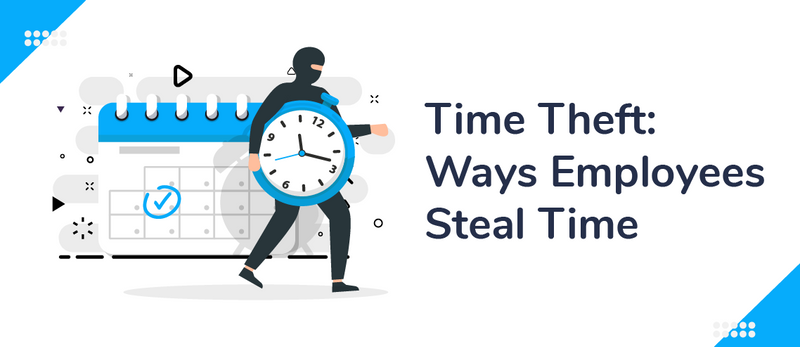Time Theft: 6 Things Employers May Consider Stealing Time

When you think about employee theft, chances are you think about stealing cash out of the register or stealing something off the shelves of your store.
But there’s another type of theft that employers have started to become concerned about — time theft. However, it’s unclear exactly what constitutes time theft, as it is not currently considered a crime under any major state or federal laws.
Here, we’ll cover six situations that employers may consider time theft and what exactly the term means.
What Is Time Theft?
Employers generally consider time theft any time that an employee tries to get paid for work that they didn’t complete. For some, this may mean falsifying their timesheets, but for others, this could mean browsing the internet during a slow period at work.
However, it’s important to note that even though the term uses the word “theft,” it is not currently considered a criminal offense. In fact, time theft is a fairly new concept, and there is no universally agreed-upon definition of what time theft is. Scholars are still trying to work out what exactly might constitute an infraction.
So, time theft isn’t really stealing time, it’s stealing money. However, the money is based on time that they didn’t work.
How Costly Is Time Theft for a Business?
Currently, there are no reliable studies on how much time theft costs businesses. The most commonly quoted statistic, which says that the average employee steals 4.5 hours of time per week, is from the 1980s and is rife with methodological errors. In fact, the figure itself was based entirely on employer estimates of how much time they believed employees wasted.
However, according to the recent study by SMG, employees steal approximately 5.5 times as much as shoplifters, equating to “more than $50 billion from U.S. businesses annually” along with 30 percent of businesses citing employee theft as the reason for going bankrupt. Theft, however, extends beyond just traditional stolen physical goods, with some employees taking advantage of employers by stealing time when they should be on the clock.
This is evident that time theft exists and it is costing the businesses. Let’s find out what are the different types of time theft before we get into its solutions.
Types of Time Theft
Currently, it is not clear what exactly constitutes time theft as there are no laws or regulations that use that term. The only usage of the term “time theft” is not commonly used on any United States federal or state government web page except in a few instances referring to time theft in municipally funded programs.
However, here are some situations that some may view as constituting time theft.
1. Buddy Punching
Buddy punching is when an employee asks another employee to punch in for them even though they are not yet at work. This could lead to very short amounts of time (on the order of a couple of minutes) being inaccurately logged or it could lead to entire days being mis-logged.
For example, an employee may ask their friend to punch in for them because they are running five minutes late, while another employee could ask their friend to punch in for a day that they don’t plan to come into work.
2. Extended Breaks
This term refers to employees that don’t return from breaks on time. For example, if an employee is allowed a 30-minute lunch break but takes an hour, this would be considered an extended break.
Some employers may consider even a five-minute, unapproved extension to be time theft. However, employers should tread cautiously, as studies indicate that it is actually these types of accusations, which would commonly be argued as unreasonable, that lead to time theft in the first place.
3. Timecard Fraud and Employees Rounding Up
Timecard fraud refers to employees that misreport the time that they spent at work. Often, this takes the form of rounding up.
For example, an employee might come into work for 45 minutes but round up to an hour. Or, they may do something more egregious, like come in for 30 minutes and report that they were there for three hours.
4. Misreporting Time Spent on a Job Site or on the Road
Just like the last type, employees can potentially steal time by reporting that they were at a job site or on the road when they weren’t. For example, if someone says that they were working one day, but they were actually at home watching TV, this would be considered stealing time.
5. Excessive Personal Time
Excessive personal time is an activity that many employers consider time theft, but it is unclear what exactly constitutes “excessive” as there are no regulations that set out any guidelines. Some employers may consider taking a single personal call excessive, while others will think that it’s completely fine.
Again, employers should be careful when accusing employees of time theft in these situations, as studies have shown that this type of supervisor behavior is one of the factors that lead to time theft in the first place.
6. Distractions from the Internet
Just like excessive personal time, there is no clear consensus as to whether being distracted by the internet constitutes time theft. This will need to be judged on a case-by-case basis.
For example, doing some online shopping when no one is in the store is likely not time theft, but ignoring customers or other tasks for hours to spend time on Reddit likely is. Employers need to be careful to set reasonable boundaries so that they don’t lose employees or incur further instances of more serious time theft.
How To Prevent Time Theft
If you want to prevent time theft, here are a few ways you can do so.
1. Invest in Time Clock Software
Having an accurate time clock is part of the groundwork you need to lay before thinking about time theft. After all, if you can’t accurately measure when your employees are working, how will you know if they are reporting their hours inaccurately?
ZoomShift is an employee scheduling tool that focuses on providing an easy-to-use, drag-and-drop schedule to employers. However, it also offers a time tracker that you can use to keep tabs on when your employees are working.
ZoomShift’s time tracking solution helps employers ensure that their employees are always punching in at the right times by blocking punch-ins from employees who aren’t scheduled for shifts. ZoomShift also uses GPS-tracking to make sure that employees are actually on-site when they punch in. Also, if you run a retail store, your attendance system can be integrated with the Kiosk Time Clock in ZoomShift. It will also keep track of early and late punches for you.
Beyond time tracking, ZoomShift also offers a fully-fledged schedule-making tool. Employees can use this to easily build schedules that update in real-time and then send out update notifications via email, text, or push notifications. Plus, ZoomShift also offers a Shift Swap feature, which allows employees to take greater control of their schedules and trade shifts with each other without needing a manager to get involved.
2. Treat Employees With Respect
Everyone deserves to be treated with respect. But many employers don’t give their employees the respect that they deserve.
What’s more, many employers don’t realize that by treating their employees poorly, they may be increasing the likelihood that they’ll commit time theft. Indeed, one study indicated that there is a correlation between time theft and the narcissistic qualities of supervisors — the more narcissistic a manager is, the more likely it is that time theft will occur.
3. Don’t Micromanage
This tip is closely related to the first one. When employees are micromanaged, they feel that they aren’t being respected and that management doesn’t trust them to do their jobs. As a result, resentment grows, and employees are less likely to feel guilty for and bad about time theft.
You can reduce the likelihood of time theft by giving your employees some breathing room and having confidence that they can handle the jobs that they were hired to do.
4. Offer an Agreeable Wage
Perhaps the easiest way to show your employees that you value them is to simply pay them more money. If you aren’t paying your employees what they are worth, they’re more likely to try to get back at you and recoup their losses via time theft.
5. Try Your Best to Make Work Enjoyable and Stimulating
One other factor that contributes to time theft is boredom. When employees are engaged in and stimulated by their work, they feel better and are less likely to commit time theft. However, if employees are constantly bored and don’t like their work, they may harbor resentment that can eventually turn into time theft.
JD enjoys teaching people how to use ZoomShift to save time spent on scheduling. He’s curious, likes learning new things everyday and playing the guitar (although it’s a work in progress).



